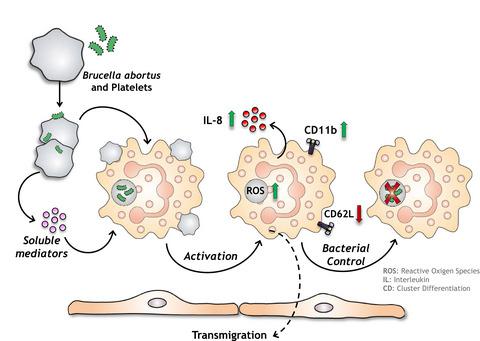当前位置:
X-MOL 学术
›
Immunol. Cell Biol.
›
论文详情
Our official English website, www.x-mol.net, welcomes your
feedback! (Note: you will need to create a separate account there.)
Brucella abortus-infected platelets modulate the activation of neutrophils.
Immunology and Cell Biology ( IF 3.2 ) Pub Date : 2020-07-05 , DOI: 10.1111/imcb.12373 Aldana Trotta 1 , M Ayelén Milillo 1 , Agustina Serafino 1 , Luis A Castillo 1 , Federico Birnberg Weiss 1 , M Victoria Delpino 2 , Guillermo H Giambartolomei 2 , Gabriela C Fernández 1 , Paula Barrionuevo 1
Immunology and Cell Biology ( IF 3.2 ) Pub Date : 2020-07-05 , DOI: 10.1111/imcb.12373 Aldana Trotta 1 , M Ayelén Milillo 1 , Agustina Serafino 1 , Luis A Castillo 1 , Federico Birnberg Weiss 1 , M Victoria Delpino 2 , Guillermo H Giambartolomei 2 , Gabriela C Fernández 1 , Paula Barrionuevo 1
Affiliation

|
Brucellosis is a contagious disease caused by bacteria of the genus Brucella. Platelets (PLTs) have been widely involved in the modulation of the immune response. We have previously reported the modulation of Brucella abortus–mediated infection of monocytes. As a result, PLTs cooperate with monocytes and increase their inflammatory capacity, promoting the resolution of the infection. Extending these results, in this study we demonstrate that patients with brucellosis present slightly elevated levels of complexes between PLTs and both monocytes and neutrophils. We then assessed whether PLTs were capable of modulating functional aspects of neutrophils. The presence of PLTs throughout neutrophil infection increased the production of interleukin‐8, CD11b surface expression and reactive oxygen species formation, whereas it decreased the expression of CD62L, indicating an activated status of these cells. We next analyzed whether this modulation was mediated by released factors. To discriminate between these options, neutrophils were treated with supernatants collected from B. abortus–infected PLTs. Our results show that CD11b expression was induced by soluble factors of PLTs but direct contact between cell populations was needed to enhance the respiratory burst. Additionally, B. abortus–infected PLTs recruit polymorphonuclear (PMN) cells to the site of infection. Finally, the presence of PLTs did not modify the initial invasion of PMN cells by B. abortus but improved the control of the infection at extended times. Altogether, our results demonstrate that PLTs interact with neutrophils and promote a proinflammatory phenotype which could also contribute to the resolution of the infection.
中文翻译:

流产布鲁氏菌感染的血小板调节嗜中性粒细胞的活化。
布鲁氏菌病是一种由布鲁氏菌属细菌引起的传染性疾病。血小板 (PLT) 已广泛参与免疫反应的调节。我们之前报道过流产布鲁氏菌的调制-介导的单核细胞感染。因此,PLT 与单核细胞合作并增加其炎症能力,促进感染的消退。扩展这些结果,在本研究中,我们证明布鲁氏菌病患者的 PLT 与单核细胞和中性粒细胞之间的复合物水平略有升高。然后我们评估了 PLT 是否能够调节中性粒细胞的功能方面。在中性粒细胞感染过程中 PLT 的存在增加了白细胞介素 8 的产生、CD11b 表面表达和活性氧的形成,而它降低了 CD62L 的表达,表明这些细胞处于激活状态。我们接下来分析了这种调节是否由释放的因子介导。为了区分这些选项,用从收集的上清液处理中性粒细胞B. abortus感染的 PLT。我们的结果表明 CD11b 表达是由 PLT 的可溶性因子诱导的,但需要细胞群之间的直接接触来增强呼吸爆发。此外,B. abortus感染的 PLT 会将多形核 (PMN) 细胞募集到感染部位。最后,PLT 的存在并没有改变B. abortus对 PMN 细胞的初始侵袭,但在延长的时间内改善了对感染的控制。总之,我们的结果表明 PLT 与中性粒细胞相互作用并促进促炎表型,这也可能有助于解决感染。
更新日期:2020-07-05
中文翻译:

流产布鲁氏菌感染的血小板调节嗜中性粒细胞的活化。
布鲁氏菌病是一种由布鲁氏菌属细菌引起的传染性疾病。血小板 (PLT) 已广泛参与免疫反应的调节。我们之前报道过流产布鲁氏菌的调制-介导的单核细胞感染。因此,PLT 与单核细胞合作并增加其炎症能力,促进感染的消退。扩展这些结果,在本研究中,我们证明布鲁氏菌病患者的 PLT 与单核细胞和中性粒细胞之间的复合物水平略有升高。然后我们评估了 PLT 是否能够调节中性粒细胞的功能方面。在中性粒细胞感染过程中 PLT 的存在增加了白细胞介素 8 的产生、CD11b 表面表达和活性氧的形成,而它降低了 CD62L 的表达,表明这些细胞处于激活状态。我们接下来分析了这种调节是否由释放的因子介导。为了区分这些选项,用从收集的上清液处理中性粒细胞B. abortus感染的 PLT。我们的结果表明 CD11b 表达是由 PLT 的可溶性因子诱导的,但需要细胞群之间的直接接触来增强呼吸爆发。此外,B. abortus感染的 PLT 会将多形核 (PMN) 细胞募集到感染部位。最后,PLT 的存在并没有改变B. abortus对 PMN 细胞的初始侵袭,但在延长的时间内改善了对感染的控制。总之,我们的结果表明 PLT 与中性粒细胞相互作用并促进促炎表型,这也可能有助于解决感染。











































 京公网安备 11010802027423号
京公网安备 11010802027423号